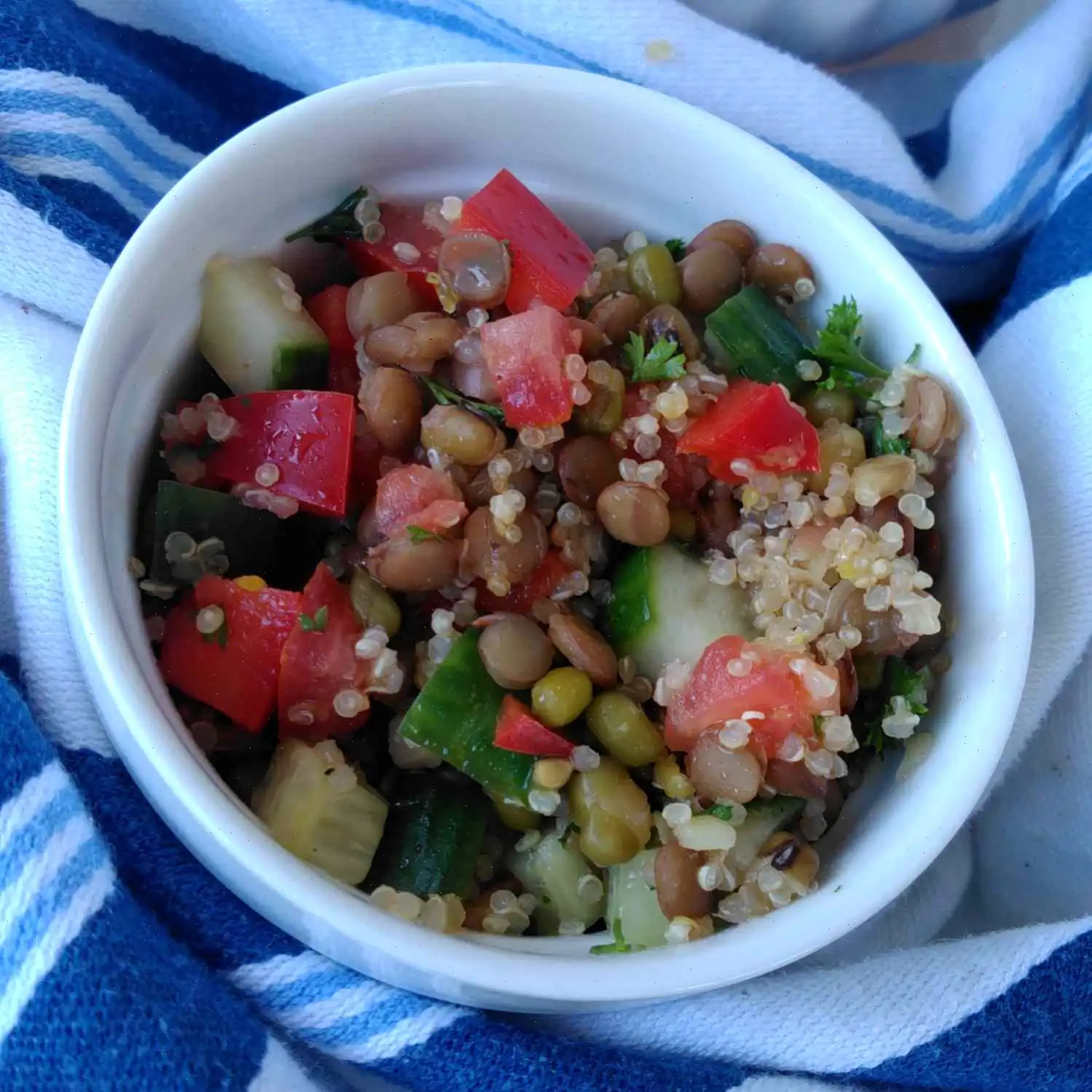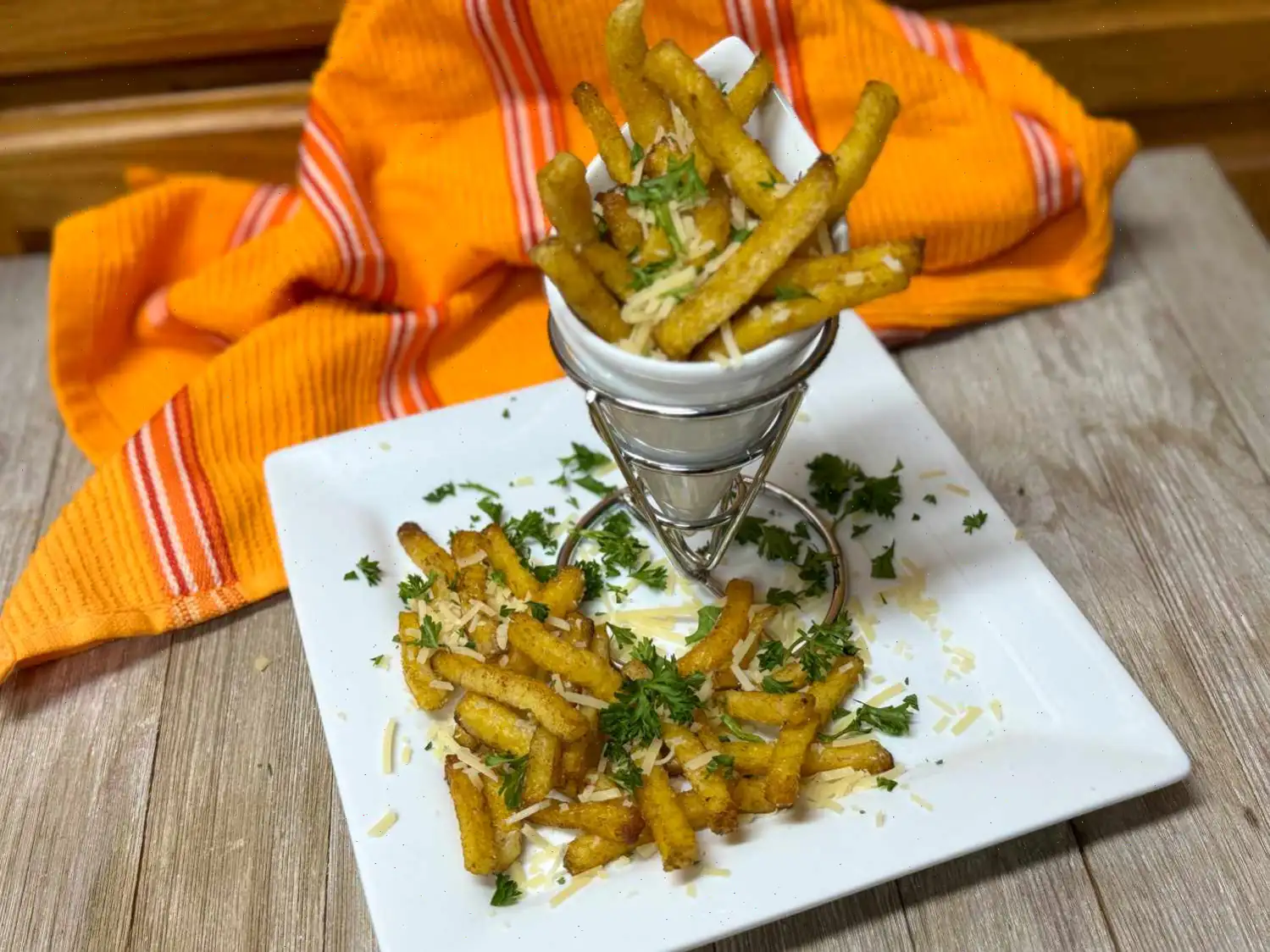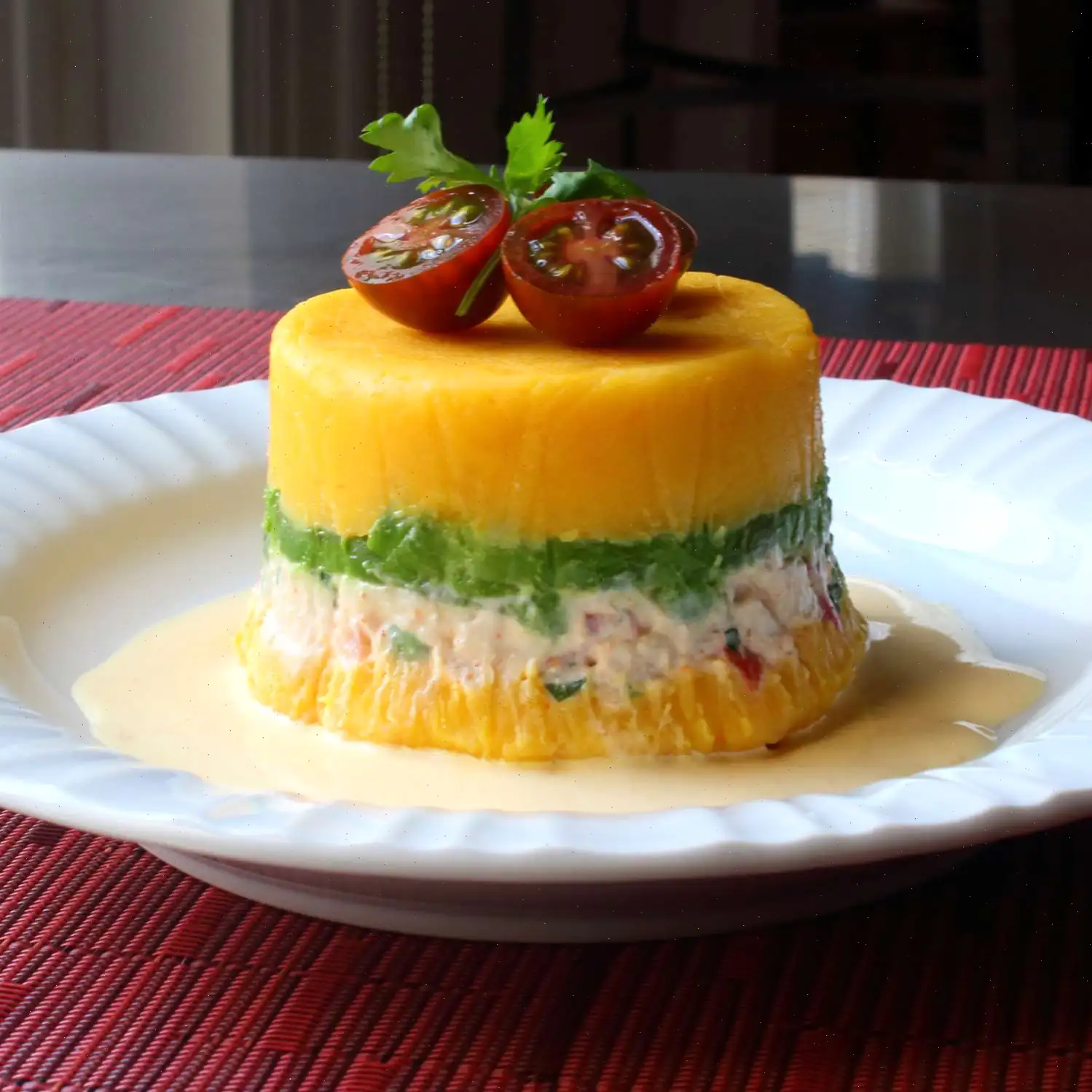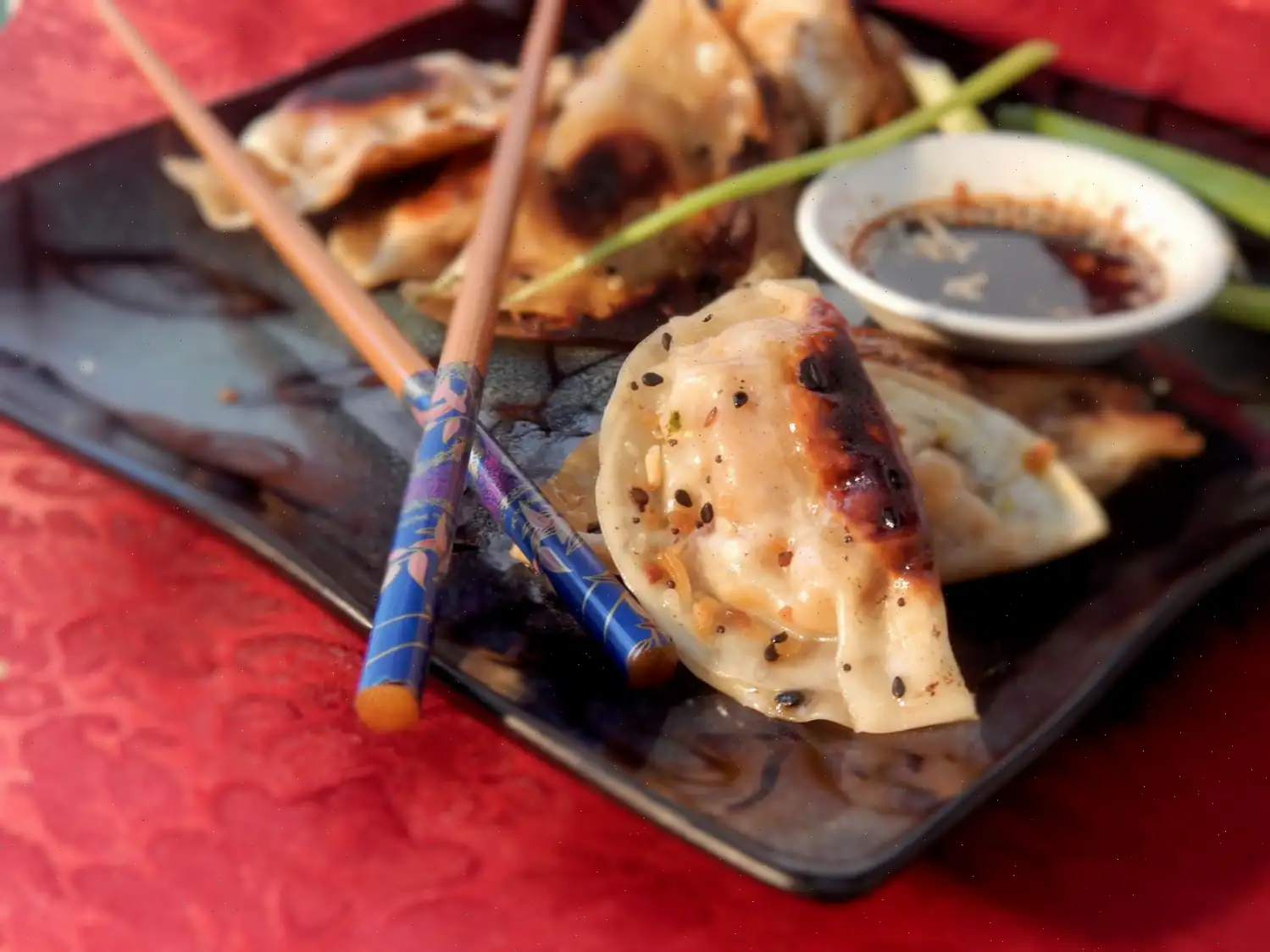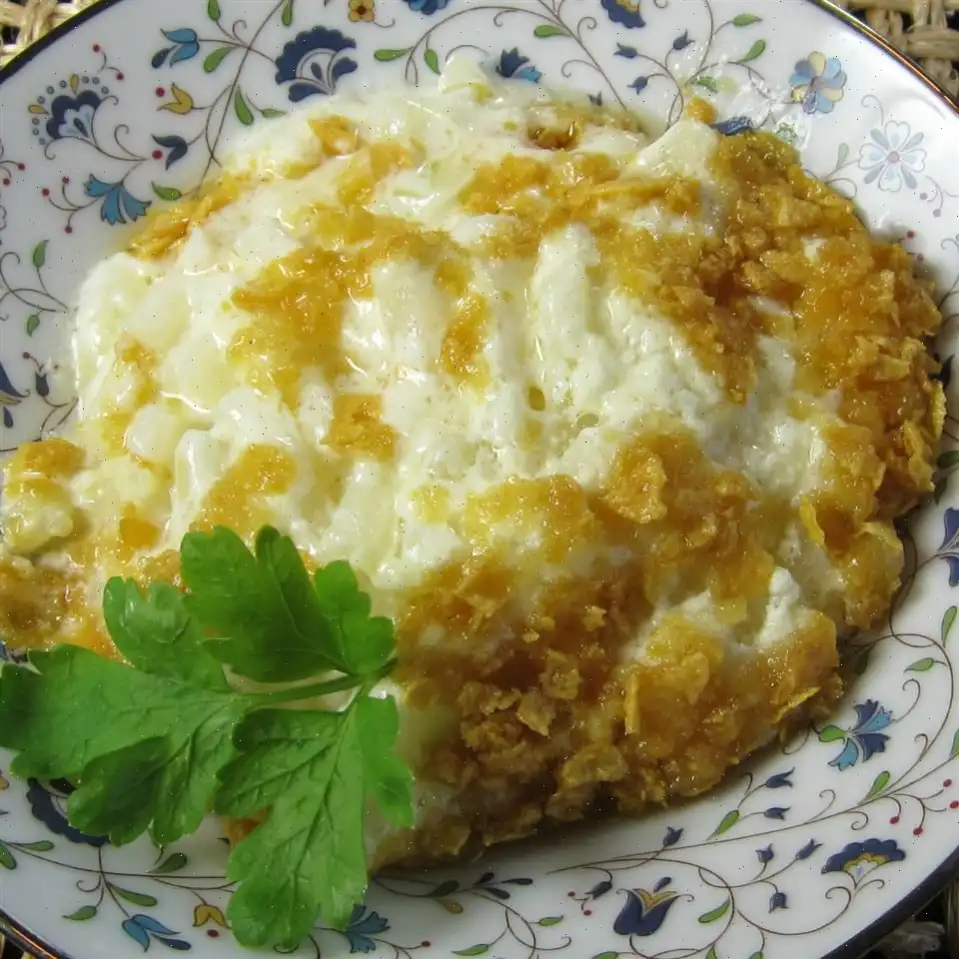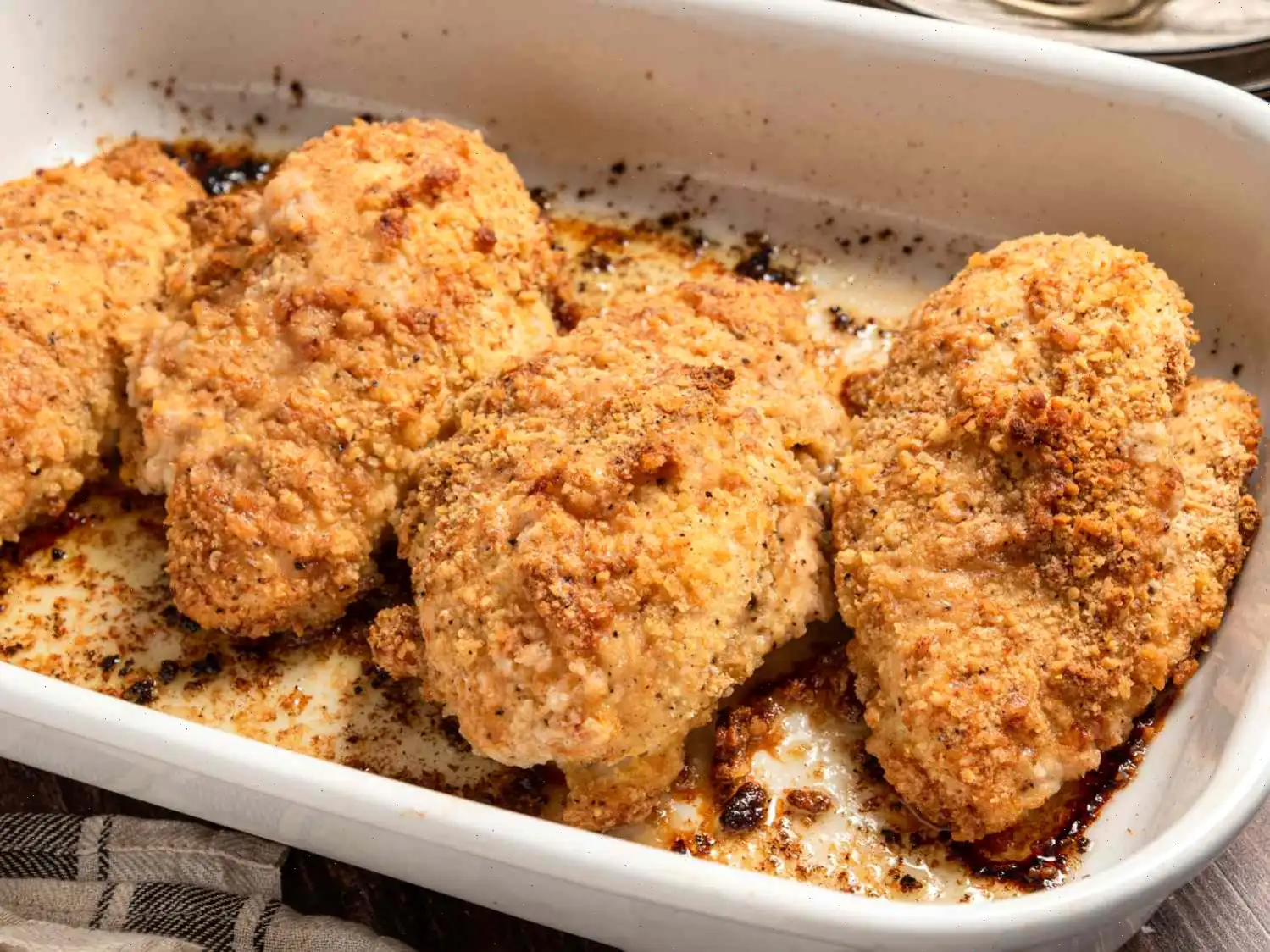
Lentil, Quinoa, and Mung Bean Salad
Ingredients
- cup dried green mung beans
- 4 cups water, plus more for soaking
- cup green lentils, rinsed
- 1 bay leaf
- 1 cup quinoa, rinsed
- 2 tablespoons freshly squeezed lemon juice
- 1 tablespoon lemon zest
- 1 tablespoon distilled white vinegar
- 1 teaspoon honey (Optional)
- 1 teaspoon salt
- Ground black pepper to taste
- cup light olive oil
- English cucumber, diced
- 1 Roma tomato, diced
- red bell pepper, cut into 1/2-inch pieces
- cup chopped green onions
- cup chopped fresh parsley
Directions
- Place the mung beans in a large and cover them with several inches of cool water. Allow them to soak for 8 hours or overnight.
- In a medium pot, bring 2 cups of salted water to a boil. Add the lentils and bay leaf. Cover and simmer over low heat for 18 to 20 minutes. Drain the lentils and set them aside to cool.
- While the lentils are cooking, drain the soaked mung beans. In a small pot, bring 2 cups of salted water to a boil. Add the mung beans, cover, and simmer over low heat for 20 to 25 minutes. Drain and set them aside to cool.
- In a medium pot, bring 2 cups of salted water to a boil and add the quinoa. Reduce the heat and simmer, uncovered, until all the water has been absorbed (about 15 to 20 minutes). Remove from heat, cover, and let it steam for 5 minutes. Set aside to cool.
- In a large bowl, combine the lemon juice, lemon zest, vinegar, honey (if using), salt, and pepper. Drizzle in the olive oil while whisking constantly until the dressing is smooth and well blended.
- Add the cooled lentils, mung beans, and quinoa to the dressing. Stir everything together to combine.
- Add the diced cucumber, tomato, red bell pepper, green onions, and parsley to the bowl. Stir gently to incorporate all the ingredients.
- Cover the bowl and refrigerate for about 1 hour, allowing the flavors to meld together and the dish to cool.
- Before serving, taste and adjust the seasoning with more salt or pepper if needed.
Nutrition Facts (per serving)
| Calories | 258 |
| Total Fat | 11g (14% DV) |
| Saturated Fat | 2g (8% DV) |
| Sodium | 305mg (13% DV) |
| Total Carbohydrates | 32g (11% DV) |
| Dietary Fiber | 8g (30% DV) |
| Total Sugars | 2g |
| Protein | 10g (20% DV) |
| Vitamin C | 20mg (22% DV) |
| Calcium | 53mg (4% DV) |
| Iron | 3mg (18% DV) |
| Potassium | 462mg (10% DV) |

History of Origin:
This vibrant salad, combining lentils, quinoa, and mung beans, has roots in various traditional dishes from across the world, especially in regions of South Asia, the Middle East, and parts of the Mediterranean. Each of these ingredients has a long history of cultivation. Mung beans have been a staple in Asia for thousands of years, widely used in soups and salads. Lentils, one of the oldest cultivated crops, are thought to have been first grown in the Near East, while quinoa was used by the ancient Incas in South America for centuries before gaining global recognition for its health benefits. The fusion of these ingredients into one dish reflects a blend of diverse culinary traditions with a modern twist focused on health and sustainability.
Regional Variations:
This salad is an excellent representation of a global fusion dish, combining grains and legumes from different continents. In India, where mung beans are commonly used in soups and stews, they might be paired with spices like cumin, turmeric, and garam masala. In the Mediterranean region, quinoa might be served alongside roasted vegetables and olives, with fresh herbs like parsley and mint. Quinoa is also popular in South America, where its often found in salads with tomatoes, avocado, and citrus dressings. The combination of these ingredients, especially with the lemony dressing, provides a refreshing contrast to the warm, earthy flavors typically found in these regions.
Differences from Similar Dishes:
Unlike many traditional salads that use leafy greens or fruit, this salad is centered around protein-packed legumes and grains. Quinoa, with its nutty taste, pairs beautifully with the earthy flavors of lentils and mung beans, giving this dish a more substantial feel compared to typical green salads. Moreover, the mung beans offer a unique texture and taste compared to other beans like chickpeas or black beans, while also being less starchy. Unlike classic Mediterranean salads that often feature feta cheese or olives, this dish is fully plant-based, making it a great option for those seeking vegetarian or vegan meals. Additionally, the dressing adds a fresh tang with lemon and vinegar, providing a lighter, more zesty finish than heavier, oil-based dressings.
Where It Is Usually Served:
This hearty salad is a perfect dish for a summer picnic or a cookout, especially because it is both refreshing and filling. Its high protein content makes it a great choice for a light but satisfying lunch or dinner. Youll often find it served at health-conscious cafes or included in buffet-style gatherings where a variety of plant-based options are available. Additionally, its versatility means it can easily be paired with grilled meats or vegetables for a more substantial meal. This salad is also great for meal prep as it holds up well in the refrigerator and can be served cold, making it an excellent option for busy weeknights or outdoor gatherings.
Interesting Facts:
1. Lentils are a key source of plant-based protein, providing about 9 grams of protein per half-cup serving. This makes them an excellent choice for vegetarians and vegans seeking to meet their protein needs.
2. Quinoa is technically a seed, not a grain, but it is cooked and consumed in similar ways to grains like rice and couscous. It is considered a complete protein because it contains all nine essential amino acids.
3. Mung beans are not only delicious but also highly nutritious. They are rich in antioxidants, vitamins, and minerals like folate, magnesium, and potassium. In many Asian cultures, mung beans are considered cooling and are used to balance heat in the body, especially during hot weather.
4. The honey in the dressing is optional, but it provides a subtle sweetness that balances the tanginess of the lemon and vinegar. For a fully vegan version, you can simply omit the honey or substitute with agave syrup or maple syrup.
5. The dish is highly customizableadd your favorite fresh vegetables or herbs depending on what is in season. For a spicier kick, consider adding a chopped jalapeo or a sprinkle of chili flakes.
FAQ about Lentil, Quinoa, and Mung Bean Salad
Comments
Amanda Rivera
02/25/2025 02:21:08 PM
This tastes way better than it looks online.
Lori
09/08/2022 08:00:07 PM
I made this pretty much as the recipe called except that I substituted a can of chick peas for the mung beans. This was light and delicious as I expected it would be. Next time I will add a chopped, seeded jalapeno to give it a little kick of something extra but the dish certainly is good as is.
Douglasrupp
08/24/2022 06:02:37 AM
To my surprise when I started making this, I had no lentils. I substituted farro and it turned out delicious. It makes a lot so I froze half before adding the cucumber, tomato, bell pepper and parsley (and after the vinegarette). I'm hoping I can thaw, add those fresh ingredients and enjoy during a future heat snap without too much compromise in taste. Will definitely make again and cannot wait to share.
Foodie
01/16/2022 06:22:09 PM
First bite - meh. Second bite - kind of addicting. I made as written except used brown lentils and I did add the (optional) honey. Allow salad to meld overnight in refrigerator before serving. Thank you for tasty, healthy recipe Bren.
manella
07/13/2020 03:41:34 PM
Fresh and delicious!! I followed the recipe to a T except I could not find Mung beans so I left them out. It was a very tasty and light lunch. As the submitter stated: fibre and protein and filling. Just as good the next day also. July 2020.


